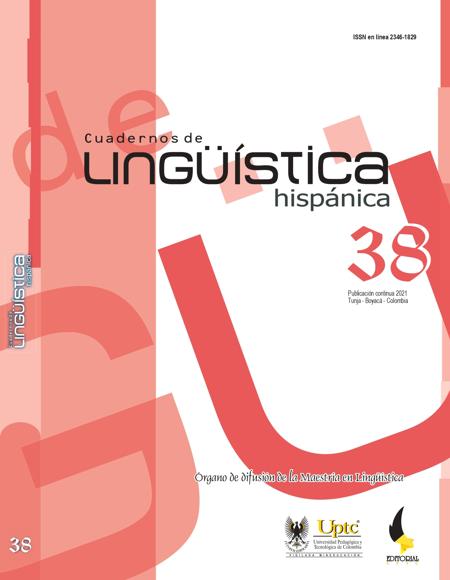Institutional Policies of a Colombian University for Students Belonging to Indigenous Communities

Abstract
This paper describes and analyzes the institutional policies of a public university
in relation to the cultural, social and linguistic needs of the indigenous students of this institution. It was based on a qualitive approach framed in the descriptive case study, which allowed the exploration of the case in its real context, through documentary analysis and semi-structured interviews as information gathering tools. It was a purposive sampling. Two indigenous students with government representation from the Cabildo Indígena Universitario participated. As a result, a significant gap was found between the linguistic policies of the institution regarding enrolling, graduation and return to the territory, and the cultural, social and linguistic conditions evidenced by the indigenous students themselves in their experiences and identity characteristics. It is concluded that a real socio-educational inclusion process is required, which
incorporates planning, creation and implementation of institutional policies that take into account the needs and characteristics of the entire population since enrolling the college, specially those of indigenous students as a minority population.
Keywords
inclusive education, indigenous peoples, educational policies, linguistic policies
References
Acuerdo 3 de 2005. Consejo Superior Universidad Tecnológica de Pereira. Por el cual se reglamentan las pruebas de suficiencia en inglés como requisito de grado.
Acuerdo 6 de 2001. Consejo Superior Universidad Tecnológica de Pereira. Por medio del cual se crea el instituto de Lenguas Extranjeras de la Universidad Tecnológica de Pereira.
Acuerdo 13 del 2015. Consejo Superior Universidad Tecnológica de Pereira. Por medio del cual se adoptan medidas relacionadas con competencias en una segunda lengua dentro del plan general de desarrollo estudiantil.
Alveiro Restrepo-Ochoa, D. (2013). La Teoría Fundamentada como metodología para la integración del análisis procesual y estructural en la investigación de las Representaciones Sociales. CES Psicología, 6(1),122-133. Disponible en: https://www.redalyc.org/articulo.oa?id=423539419008
Artículo 18 del Reglamento Estudiantil Universidad Tecnológica de Pereira.16 de diciembre 2006. Consejo Superior.
Caicedo, J. A., y Castillo, E. (2008). Indígenas y afrodescendientes en la universidad colombiana: nuevos sujetos, viejas estructuras. Cuadernos Interculturales, 6(10), 62-90.
Carvajal, A. (2017). Cabildo indígena de la UTP, un ejemplo de ética y buen gobierno. Gestión de la Comunicación y la Promoción Institucional UTP. Recuperado de https://comunicaciones.utp.edu.co/noticias/34489/cabildo-indigena-de-la-utp-un-ejemplo-de-etica-y-buen-gobierno
Clausó, A. (1993). Análisis documental: el análisis formal. Revista General de Información y Documentación, 3(1), 11. Disponible en https://revistas.ucm.es/index.php/RGID/article/view/RGID9393120011A
Folgueiras, B. (2016). Técnica de recogida de información: La Entrevista. Barcelona.
Cruz, E. (2014) ¿Qué deben ser las políticas públicas interculturales? Ciencia e interculturalidad. 15 (2). 68 -80.
García, R. C. (2013). La Educación Superior en Colombia en Población de Grupos Étnicos y Víctimas: Instituto Colombiano de Crédito Educativo y Estudios Técnicos en el Exterior ICETEX. Bogotá: Colombia.
García, O. & Sánchez, M. (2018) Transformando la Educación de Bilingües Emergentes en el Estado de Nueva York. Language Education and Multilingualism. (1) 138-156.
Gragilia, E. (2017). Políticas públicas: 12 retos del siglo 21, Buenos Aire, Argentina: Konrad Adenauer Stiftung.
Hammel (1997). Indigenous Language Policy and Education in Mexico. En S. May y N. H. Hornberger (eds), Encyclopedia of Language and Education, Language Policy and Political Issues in Education,1(2), 301–313.
Hanne, A. (2018). Estudiantes indígenas y Universidad: realidades y retos ante la diversidad cultural. Caso de la Universidad Nacional de Salta. Alteridad, 13(1), 14-29. https://doi.org/10.17163/alt.v13n1.2018.01.
Londoño, S. L. (2017). Estudiantes indígenas en universidades en el suroccidente colombiano: Tensiones entre calidad y pertenencia. Perfiles educativos, XXXIX (157), 52-69.
Merriam, S.B. (1998). Qualitative research and case study applications in education.
Jossey-Bass: San Francisco.
Ortiz, J. A. C., & Guzmán, E. C. (2018). Indígenas y afrodescendientes en la universidad colombiana: Nuevos sujetos, viejas estructuras. Cuadernos interculturales, 6(10), 62-90.
Paz Sandín, E. (2003). Investigación cualitativa en Educación. Fundamentos y tradiciones. Editorial McGraw Hill. España.
Seid, G. (2016). Procedimientos para el análisis cualitativo de entrevistas. Una propuesta didáctica. Métodos, metodologías y nuevas epistemologías en las ciencias sociales: desafíos para el conocimiento profundo de Nuestra América. Universidad Nacional de La Plata, Argentina.
UNESCO. (1998). Declaración mundial sobre la educación superior en el siglo XXI: Visión y acción. Presented at the Conferencia Mundial sobre la Educación Superior, París. Recuperado de http://www.unesco.org/education/educprog/wche/declaration_spa.htm
Usma, J. A., Ortiz, J. M., y Gutiérrez, C. (2018). Indigenous students learning English in higher education: Challenges and hopes. Íkala, Revista de Lenguaje y Cultura, 23(2), 229-254
